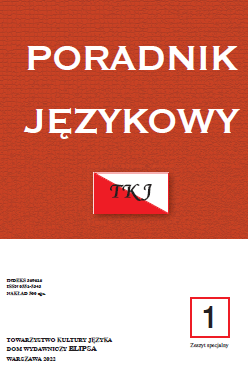HYBRYDALNE FORMY CZASOWNIKOWE W JĘZYKU POLSKIM I UKRAIŃSKIM
HYBRID VERB FORMS IN POLISH AND UKRAINIAN
Author(s): Natalia SZCZERBIJContributor(s): Monika Czarnecka (Translator)
Subject(s): Theoretical Linguistics, Syntax, Semantics, Comparative Linguistics, Western Slavic Languages, Eastern Slavic Languages
Published by: Dom Wydawniczy ELIPSA
Keywords: verb forms; verbal noun; adjectival participle; adverbial participle; impersonal forms ending with -no; to–infinitive;
Summary/Abstract: Hybrid verb forms constitute a relevant aspect that has been little studied by linguists. The paper discusses hybrid verb forms in order to determine structural and semantic differences against the background of Polish and Ukrainian. The hybridity of verb forms lies in the formation of parts of speech that combine categories characteristic of different classes of words, such as voice, tense, reflexivity, case, number. Such forms include the verbal noun, adjectival participle, impersonal predicative forms ending with -no, -to, and infinitive. The use of the comparative analysis made it possible to separate common and different features in both languages. Polish and Ukrainian are characterised by different degrees of convergence with verb or noun, in particular due to the category of reflexivity. The paper states that all these mixed parts of speech are united by the category of aspect, which relates primarily to verb. The paper also analyses the functioning of hybrid verb forms in modern Polish and Ukrainian.
Journal: Poradnik Językowy
- Issue Year: 2022
- Issue No: 01
- Page Range: 147-163
- Page Count: 17
- Language: Polish
- Content File-PDF

